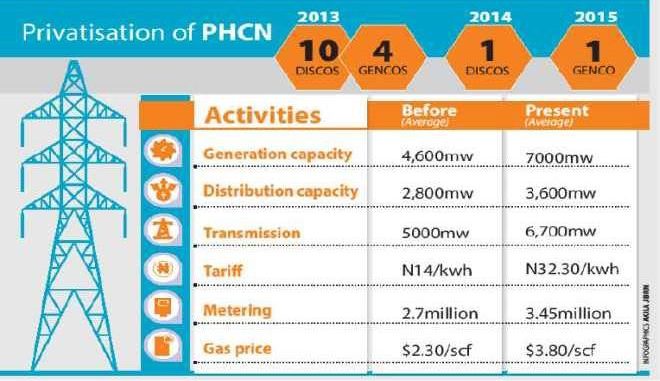
By tomorrow, the privatisation of major utilities in the power sector would be four years old, yet the constraints of debts crises, collection loses, poor metering, power outages and about N1 trillion liquidity crises have continued.
Many Nigerians are still uncomfortable with post privitisation of the Power Holding Company of Nigeria (PHCN), as many residents and industries have not seen the needed changes at their homes and industries.
In Kano, some residents in the Kurna Asabe, Dala Local Government, said as far as they are concern, there is no difference between the pre and post-privitisation periods. A secretary of Kakana Development Initiative, Aminu Abdullahi said the electricity situation has not recorded any improvement since the privitisation of the PHCN.
Some residents in Ejigbo Local Council Development Area, Lagos recently raised eyebrow over outrageous bills and implored the Ikeja Electricity Distribution Company (IKEDC) to provide them with pre-paid meters.
The customers decried the situation as they live in darkness and yet forced to pay bills for electricity they never consumed.
Also some customers in Lokoja, Kogi State recently lamented that they were being charged exorbitant bills even when they did not enjoy power supply.
But the pioneer Chairman of Nigerian Electricity Regulatory Commission (NERC), Dr Ransome Owan, at an energy workshop on Saturday, said the sector was facing the constraint four years into the privatisation because contracts are not still effective and some of the Conditions Precedents (CPs) set earlier are still not fulfilled.
Owan noted that revenue collection losses are still high due to energy theft, meter bypassing and the poor attitude of Nigerians to paying power bills.
How the PHCN was sold
On November 1, 2013, former Vice President and Chairman, National Council on Power (NCP), Namadi Sambo, handed over 60 per cent control of 10 Distribution Companies (DisCos) and four Generation Companies (GenCos) to private firms that had paid about $3 billion. The Transmission Company of Nigeria (TCN) was not privatised though it was a critical base for electricity supply.
The initial four GenCos were Ughelli, Geregu I, Kainji/Jebba Hydropower and Shiroro Hydropower. Sapele GenCo was handed over later. The initial 10 DisCos were Ikeja, Eko, Ibadan, Jos, Kano, Yola, Abuja, Benin, Enugu and Port Harcourt. Kaduna DisCo was handed over in 2014.
In the span of five years, the privatised firms got Capital Expenditure (CAPEX), Operational Expenditure (OPEX) and other Key Performance Indicators (KPI). While the GenCos were to rehabilitate their turbines and expand generation capacity, the DisCos were to provide meters for customers to stop the cantankerous over billing through the estimated billing system, and then reduce their Aggregate Technical, Commercial and Collection losses (ATC&C) which was over 50 per cent under the defunct PHCN.
The liquidity crises worsened in 2016 with DisCos paying an average of 30 per cent of their monthly energy bills till date, data from the Nigerian Bulk Electricity Trading Plc (NBET) showed.
The deficit in power generation, poor tariff and other inconsistent practices, resulted in a huge market shortfall of over N1 trillion, the private operators said.
What the new owners say
For the GenCos, Mainstream Energy Solutions Limited (MESL), COO Mr Jose Villegas, said they have raised their capacities to 26 per cent of the national grid since privatisation.
Rating the sector in the last four years, Managing Director of Abuja DisCo, Ernest Mupwaya, told newsmen last Saturday that the sector has performed fairly. For his DisCo, Mupwaya said it has invested much in its networks.
He said the non-cost reflective tariff is the bane of power supply improvement. While he said GenCos’ tariff had risen by 103 per cent since 2013, the DisCos’ only rose by 16 per cent, creating the liquidity crisis.
Calls for reversal, FG’s decision
There have been calls from several quarters to reverse the privatization, besides the senate that condemned that attitude of the PHCN successor companies towards improving power supply, industry stakeholders such as business mogul, Alhaji Aliko Dangote, Manufacturers Association of Nigerian among others, have all joined the call to revisit the privitisation. However, the Bureau of Public Enterprises (BPE) which supervised the transaction and continues to monitor the sold-out utilities said the private investors have a pact that allows them to invest in the utilities for five years to enhance the network.
To address the crisis in post privatization, President Muhammadu Buhari at the recent Nigeria Economic Summit (NES) in Abuja said a review is being conducted for the privatised power firms. He noted that negotiations would commence with GenCos and DisCos where the country is having the most difficulties in ensuring adequate power supply.
END

Be the first to comment